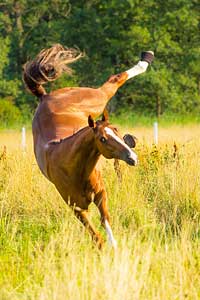Why do horses develop problems

This is a very common question from owners and everyone wants one answer, however there is often more than one cause. Problems often arise as a result of compensation for trauma, overuse, congenital and conformational defects combined with the activities of normal daily living. These develop often gradually over a period of time and can result in a sudden major injury with no precipitating cause or as a result of a minor injury.
Historically, horses would have lived on the open plains, constantly moving and grazing throughout the day, their general posture therefore would have been with their heads lowered. In domestication, humans have forced confinement in the stable or in small paddocks on horses, limiting the horse’s natural tendency to graze only little and often and only feeding them at convenient mealtimes. We then expect these animals to carry a rider, perform a specific task,Why Do Horses Develop Problems and perform to the best of their ability. All these factors reduce the optimal performance that we desire from our animals.
This altered life style of the horse has created numerous reasons for injuries which can be divided into two groups.

The first group consists of the accumulation of small disturbances throughout the body over long periods of time. Examples are riding on the road or working on hard surfaces, poor foot balance, poor conformation, poor saddle fit, unbalanced rider, continual circling, uneven bedding, large slope in the stable floor and many more.
The second group consists of the major traumas that can affect a horse, such as a trailer accident, slips, falls, fractures or soft tissue injuries to limbs which affect the ligaments or tendons. All these will influence the horse’s musculoskeletal system significantly.
Chiropractic provides expertise in the evaluation of spine and joint problems that can provide the Vet additional means of diagnosis and early treatment options in certain lameness problems; especially conservative treatment of bio-mechanically – related musculoskeletal disorders.
 031-711 66 00
031-711 66 00  031@kiropraktorcentrum.com
031@kiropraktorcentrum.com 
 Open 8-17
Open 8-17


